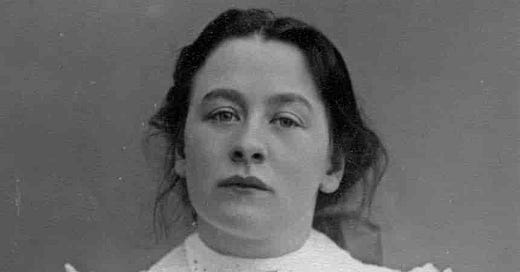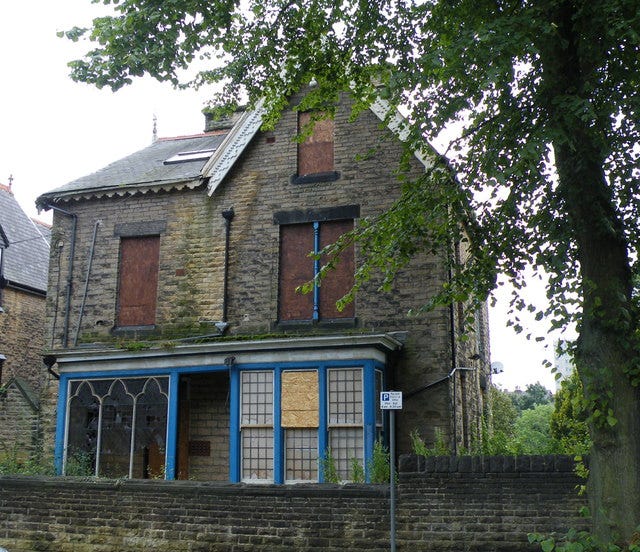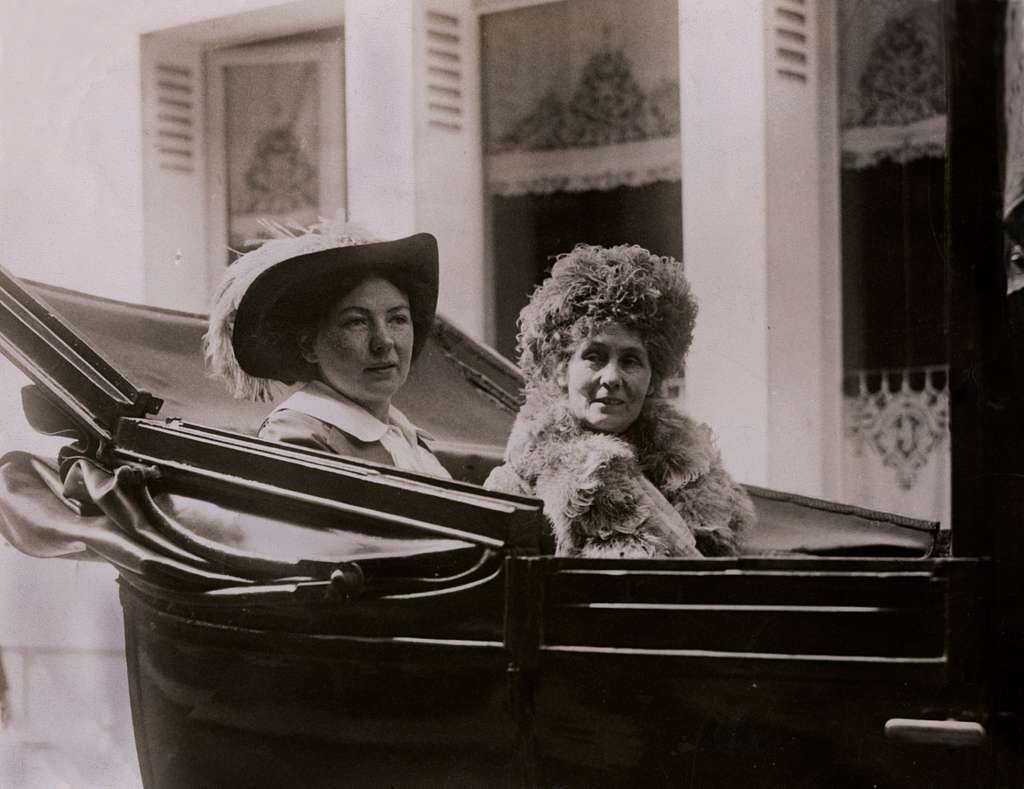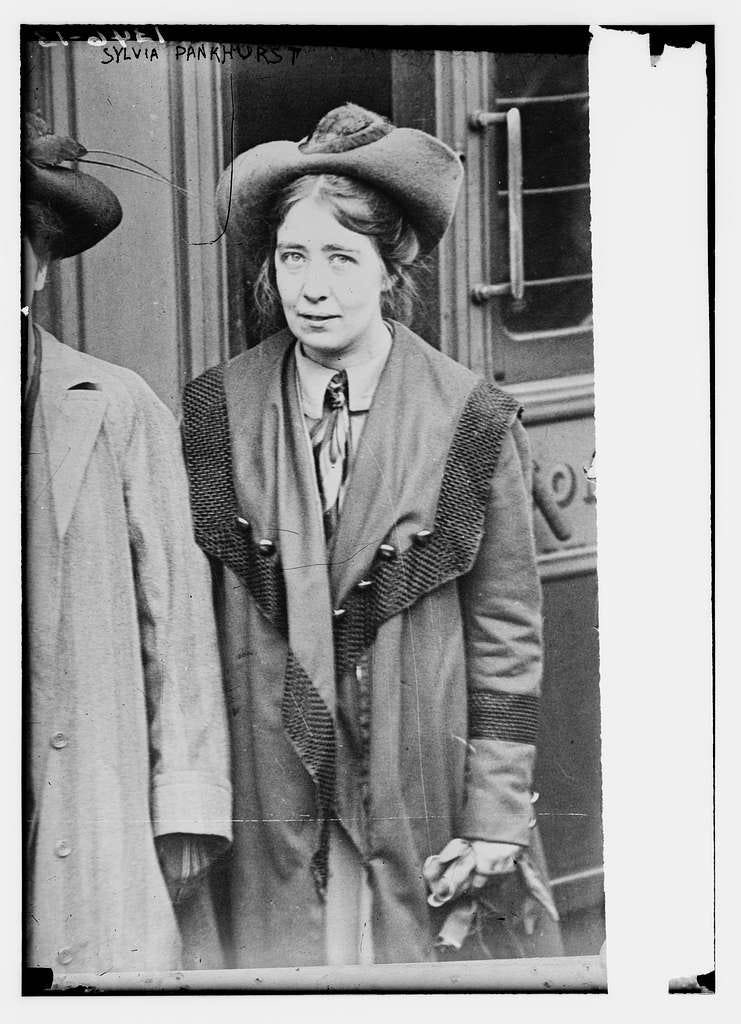Welcome to A Narrative of Their Own, where I discuss the work of 20th century women writers and their relevance to contemporary culture.
If you enjoy reading essays on literature as well as monthly reviews of great books and recommended reading, please consider a free or paid subscription.
On a recent walk down a familiar street in my local neighbourhood, I noticed a plaque situated in the pavement underfoot. Stopping to take a better look, I found that it was a commemorative plaque to Adela Pankhurst, the youngest - and arguably least well known - daughter of suffragette campaigner Emmeline Pankhurst.
As a researcher into women’s narratives and feminism, I was delighted to make the discovery that a suffragette - and one of the Pankhurst family - had resided for a short time in a house just down the road! I immediately set out to research more about this elusive Pankhurst, whom I had never previously heard much about. What I found was not necessarily a hero to be looked up to, but an interesting history nonetheless.
Adela Pankhurst resided at the property at 45 Marlborough Road in the city of Sheffield, UK, between 1910 and 1912. We know this partly because she took part in a rebellion against the UK census of 1911, which many suffrage groups resolved to boycott due to its perceived invasive questioning around marriage and women’s lives, and the demand that it be completed by the ‘head of each household’, generally male.
Adopting the property as the Sheffield Headquarters of the suffrage movement, where she stayed with the owner Helen Archdale, a WSPU coordinator, Adela and a group of women staged a civil disobedience act against the census, which asked such probing questions as how long a marriage had lasted and how many children had been born there, living or dead, causing many women to argue that if “women do not count, neither shall they be counted.”
Many letters and articles appeared in the local press, leading a local reporter from the Sheffield Telegraph to visit the house, where he reported finding “48 women and one man.” Whilst Adela and Helen were noted as present on the census return, other members of the household, such as Helen’s three children, their nurse, house servants and others are listed but no names given, the entries showing ‘NK’ for ‘not known’.
In honour of this act of rebellion and the daughter of the most famous suffragette in England, local residents had campaigned for years for a commemorative plaque to show the importance of the house in local history.
However, the story of Adela Pankhurst is more complicated than it would first seem.
Born on 19th June 1885 in Chorlton upon Medlock, Manchester, Adela was the third daughter of Richard Marsden Pankhurst and Emmeline Pankhurst. Although an upper middle class family, Richard Pankhurst supported liberal intellectual pursuits, including working-class self improvement movements, and influenced his wife and daughters in this. He died when Adela was just thirteen years old, whereupon his widow and daughters continued to campaign for improvements within society.
Adela began teacher training at Manchester School for Girls, against her mother’s wishes, and although she did not complete her training, she was affected by the effects of poverty on the children at the school.
Emmeline and Adela’s two older sisters, Christabel and Sylvia, were members of the Independent Labour Party and later founded the Women’s Social and Political Union (WSPU) which demanded the franchise for women. Adela also became a paid organiser for the organisation, mostly concentrating her work around Yorkshire, where she wished to improve the lives of working-class women. Her thinking behind this was that if she could improve their lives, then this would have a positive effect on their children’s lives.
Adela became a compelling speaker, but had to eventually withdraw from the campaign for women’s suffrage due to exhaustion following several imprisonments for militant suffragette acts. She began agricultural training at Studley College in Warwickshire, later leaving for Italy with Helen Archdale for a period.
It was reported that, as a late-arriving child in the Pankhurst family, Adela believed her mother resented her, and Emmeline’s preference for Christabel, who became her closest political ally, was no secret. Adela also formed a deep jealousy of her sister Sylvia, claiming that the pair “lived too much together within ourselves” to ever be good friends.
By 1913, Emmeline and Christabel had begun to deal in aggressive tactics within the movement such as window breaking, hunger strikes and bombings. They were embracing the political right more and more, and were shocked at Sylvia’s ongoing relationship with the working class organisations of East London. Adela shared a fondness for socialism with her sister Sylvia, meaning that when Emmeline and Christabel summarily ejected Sylvia from the movement they had founded, they decided that Adela needed to go too.
Adela was given £20, some warm clothes, and a boat ticket to Australia. She never saw her mother Emmeline or either of her sisters again.
Adela initially arrived in Melbourne to a hero’s welcome, being the daughter of the most famous feminist suffragette.
“You have heard a great deal about broken windows,” she told a crowd at the Melbourne Auditorium. “I can tell you about the broken lives that caused the broken windows.”
However, the celebration of Adela’s arrival didn’t last long.
Emmeline had given Adela a letter of introduction to Melbourne feminist Vida Goldstein, and soon after her arrival, Adela became an organiser for Goldstein and the anti-war, anti-conscriptionist, Women’s Political Association and Women’s Peace Army. Becoming one of their best speakers, she also joined the Victorian Socialist Party, disrupting opponents’ meetings by utilising a former WSPU tactic of repeated questioning. At this time she met her future husband, seaman and trade unionist, Tom Walsh. The pair campaigned actively against conscription, as well as causes such as high food costs, leading to a jail sentence of four months for Adela.
Adela and Tom were at the foundation meeting of the Communist Party of Australia, where it was reported that Adela appeared with a crying child on her knee, and Adela and Tom became co-founders of the party.
Adela’s anti-war campaigning caused her mother Emmeline to telegram the Australian prime minister Billy Hughes to denounce her youngest daughter, however her political convictions drew her closer to her sister Sylvia, who had also been a central figure in the early machinations of the British Communist Party. Even Emmeline’s eldest daughter Christabel had left the cause at this point, drifting off to America where she became an evangelical Seventh Day Adventist.
Adela’s initial enthusiasm for communism appears to have faded however by 1923, when both herself and her husband left the party. Following a later stint in jail for Tom Walsh following his involvement in the seamen’s strike, almost causing his deportation, the couple had no further faith in union militancy and in 1927, Adela launched the Australian Women’s Guild of Empire which was dedicated to fighting communism and instead upholding Christian ideals and safeguarding the family.
Emmeline Pankhurst, now a member of the Conservative party, received a letter from her youngest daughter explaining that she and Tom had changed their minds about socialism. Emmeline replied shortly before her death to claim she was “full of regret for the long rift”.
Adela began to denounce contraception, abortion and even nursery schools as detrimental to the maternal values she identified as the key legacy of suffragism through her writing at this time, becoming further right, politically. Although her sister Sylvia had also parted ways with the Communist Party, she remained on the political left, supporting sexual freedom and eventually moving to Addis Ababa to assist in Ethiopia’s struggle against fascist Italy. Adela, enraged by her sister’s 1931 account of the suffragette movement, was once again estranged from Sylvia.
Adela began to drift further towards the right throughout the 1930s, embracing anti-semitism, appearing to write favourable accounts on Nazi Germany and becoming an organiser during WWII for Australia First, a pro-Japanese fascist organisation. For this, she was once again sent to prison in 1942, where she commenced a hunger strike until the authorities released her.
Following this last hurrah, Adela appears to have retired from public campaigning, although did stage a last minute reinvention just before her death in 1961 when she converted to Catholicism.
Only one successful biography of Adela Pankhurst appears to have been written about the most obscure of the Pankhurst family: Vera Coleman’s 1996 book The Wayward Suffragette.
Perhaps historians have shied away from the disturbing portrait of Adela’s later right-leaning political assertions. Certainly, I am sure that the later Women’s Movement would have preferred to celebrate the unification of women through the winning of the vote, spearheaded by the Pankhursts, than to linger for too long on the rifts within the Pankhurst family or the rather alarming ideas the youngest daughter had begun to develop.
Regardless, it was interesting to discover on a winter’s walk one random January afternoon that a member of one of the most well-known political activist families spent time within my local leafy suburb, and that for a while, acts of notable rebellion occurred between the walls of an unassuming local property.
If you’re new around here, I usually write about all things women literature related. My paid subscribers also receive a monthly review of great books and recommended reading. Please consider a free or paid subscription - your support helps keep this newsletter afloat!
Not into commitment? Why not contribute to my book fund instead?








This confirms my long held suspicion that there was something pathological about the Pankhursts devotion to the cause of suffrage,not a desire for social justice at all. I'm sure others in the movement were devoted to Social Justice but used (maybe unwittingly) the Charismatic Mum + Daughter who got them Noticed while the imo psychopathic two got their fill of attention and 'significance'. Thank you for researching this.
Interesting - I'd never heard of Adela. I was also unaware of the later political allegiances of Emmeline and Christabel - another area of my education sadly lacking.